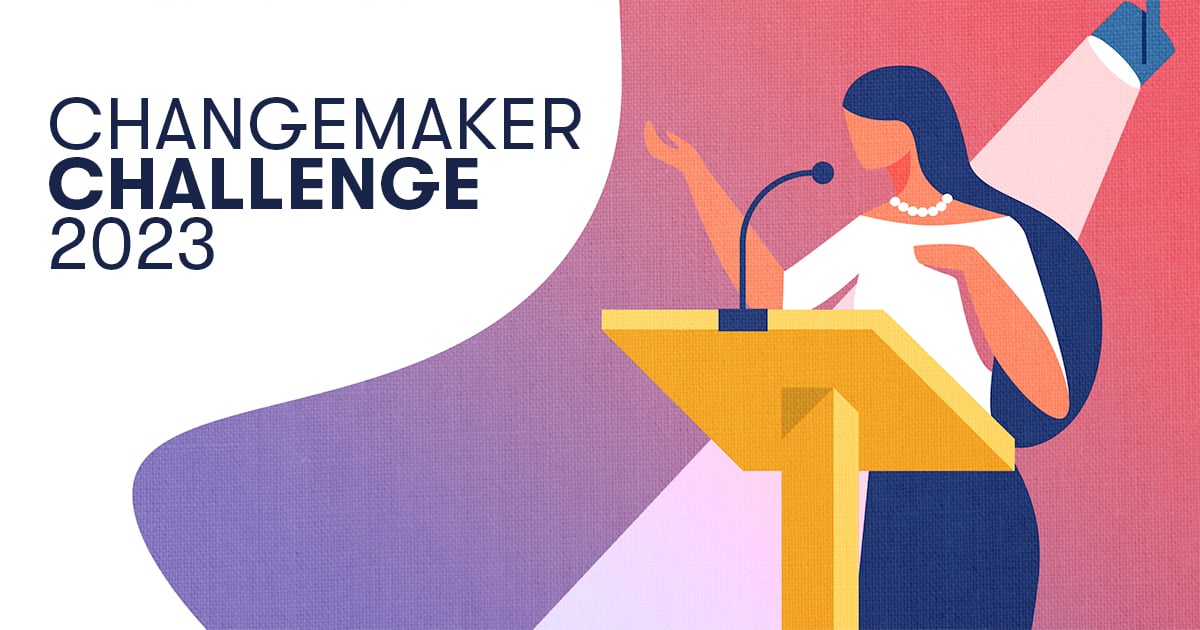
Kogod School of Business
Imagine having a plan to make the world a better place, but you have to explain it in a minute and a half.
That was precisely the challenge for dozens of AU students this month.
The Kogod School of Business’ inaugural Changemaker Challenge, hosted by the Veloric Center for Entrepreneurship, brought together first-year undergraduate and first-year graduate students for a competition centered around enacting meaningful social change.
The event, which culminated with a change-driven pitch competition, called on students to share their concrete, actionable ideas for making a social impact.
The catch? They’d have just 90 seconds—no slides or props—to make their case.
How the Changemaker Challenge Worked
The undergrad-versus-undergrad, graduate-against-graduate competition had cash on the line: $2,000 for the winners and $500 for the runners up.
To prepare, contestants first gathered on October 4 for an interactive workshop aimed at helping students build public speaking confidence and honing strategies for effective storytelling that creates compelling message.
The workshop also served as a chance to drill down on the type of societal impact judges would be interested in hearing.
October 7 was pitch day.
In front of seven faculty judges, contestants made their elevator pitches for how they’d implement meaningful change.
Jesús Zorrilla, CAS ‘27, a biology major, earned top honors as the undergraduate winner.
A native of New Orleans, Zorrilla presented a plan centered around sustainable architecture, demonstrating the need for deeper research into fungal-based building materials to replace more traditional bricks and concrete.
Researchers—Zorrilla among them—have increasingly studied how mycelium, the building blocks of mushrooms, might be used to make a variety of commercial products in the future in the interest of sustainability.
For Zorrilla, the idea was decidedly personal, having seen, firsthand, the devastating effects of natural disasters —most notably Hurricanes Katrina (2005) and Ida (2021).
“You watch houses of your best friends, destroyed; the rooms are torn off, the streets are unusable. This idea that we need some sort of sustainable architecture, it’s a very prevalent aspect of my life,” Zorrilla said.
Of course, studying the problem and having a well-researched plan is one thing. Conveying the impact to a panel of judges in 90 seconds, no less, is another.
The most challenging part is, how to not only write to explain this kind of complicated, technical thing, but also how to get people to care."

Jesús Zorrilla
Biology student, College of Arts and Sciences
“I didn’t know if sustainable architecture was going to be something that was enough to grab people’s attention. But it turns out it is," Zorrilla said.
Among the graduate participants, Shane Ray Martin, a first-year Kogod MBA student, came away victorious with a pitch for the use of artificial intelligence as a means to reduce suicide hotline wait times.
“At some hotlines, wait times can be too long, thus calls for people who are in distressed might go unanswered,” Martin said, leaning on front-line experience as a former hotline negotiator.
“I want to leverage AI for good and use it as a peacemaking tool rather than a warmaking machine,” he said, alluding to discussion about AI’s uses and threats that’s dominated discussion all year.
Martin credits coaching provided by the Kogod Center for Professionalism and Communications as a key to making his pitch more focused and compelling. The center provides students with services like peer feedback and coaching on verbal and slide-driven business presentations
“We made it catchier. We made it more interesting. We made it more relatable to the audience, which is so key,” Martin said.
Alexa Socquet AU’27 and Sanjana Goel MBA’25 were the respective undergraduate and graduate runners-up.
Altogether, the presentations helped showcase the remarkable changemaking capacity present in the AU student body, said Danielle Vogel, Assistant Director of the Veloric Center for Entrepreneurship and Kogod professor, who spearheaded the event.
"It was both impressive and deeply inspiring to cheer on our first-year students as they transformed their desire to make a social impact into a plan for changemaking," Vogel said. "They developed compelling pitches and shared their stories with poise and confidence. I can't wait to see what they do with their ideas — both over the course of their time at AU and well beyond."
